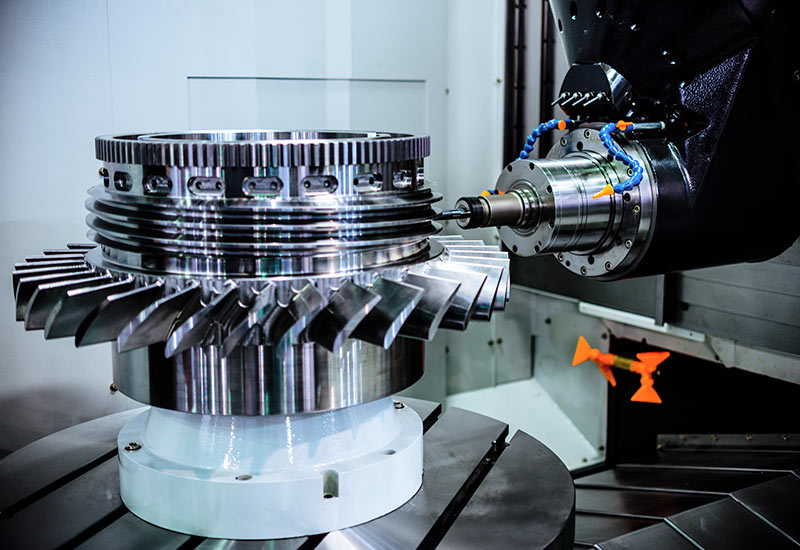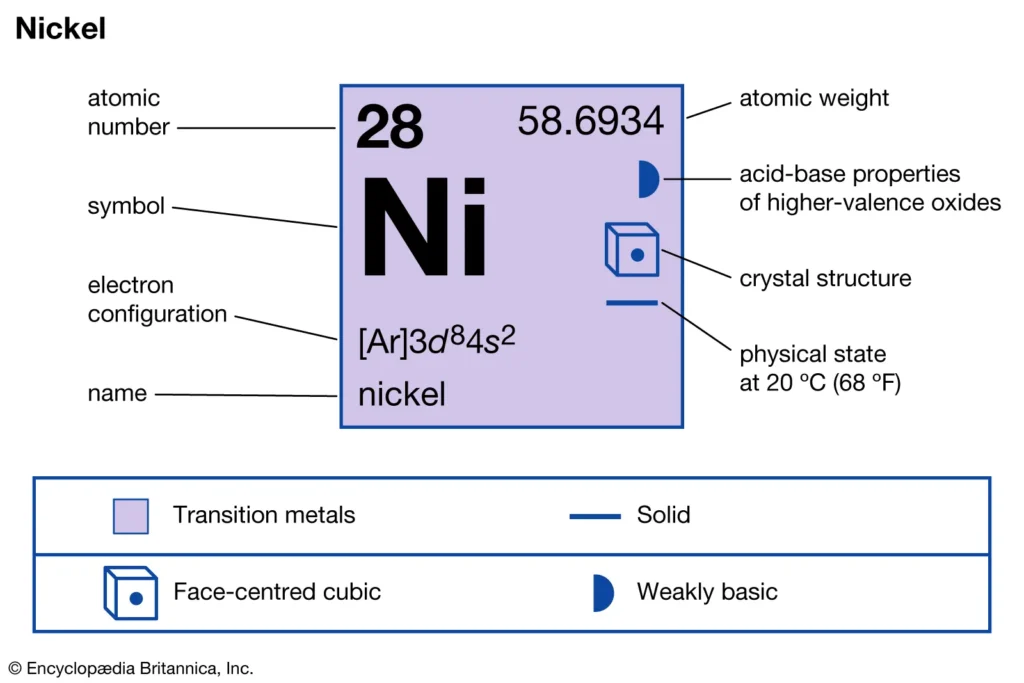The Ultimate Guide to Nickel Alloy Castings and Nickel Casting
Table of Contents
Introduction

Nickel casting and nickel alloy castings are essential for high-performance metal components. These castings offer strength, corrosion resistance, and high-temperature stability, making them ideal for aerospace, chemical, energy, and medical industries.
Example: Turbine blades made from nickel alloy castings maintain their shape and performance even under extreme heat and operational stress.
What is Nickel? Properties and Benefits for Castings

Nickel as a Metal
Nickel is a silvery-white transition metal with a high melting point (~1455°C), ductility, and natural corrosion resistance.
How Nickel Improves Castings
When added to alloys, nickel enhances strength, toughness, and wear resistance, while also providing oxidation resistance.
Example: Nickel in turbine casings prevents oxidation during prolonged exposure to hot gases, extending component lifespan.
Understanding Nickel Alloy Castings
Definition and Overview
Nickel alloy castings are components created by casting molten nickel-based alloys into molds. Combining nickel with metals like chromium, molybdenum, or cobalt enhances performance for specific applications.
Pure Nickel vs. Nickel-Based Alloys
Pure nickel castings are favored for chemical and marine applications due to corrosion resistance. Nickel-based alloys, however, offer higher strength and durability for high-stress or high-temperature uses.
Example: Monel alloy castings are widely used in pumps and valves handling acidic solutions, while Inconel castings are chosen for jet engine turbines.
Benefits of Nickel Castings
Corrosion Resistance
Nickel alloy castings resist oxidation, rust, and chemical attack, making them reliable in harsh environments.
Example: Hastelloy cast pumps can operate for over 10 years in chemical plants without significant degradation.
High-Temperature Performance
These castings maintain mechanical strength and dimensional stability even above 1000°C, crucial for engines and turbines.
Example: Gas turbine blades using Inconel castings endure continuous high-temperature operation without warping.
Strength and Wear Resistance
Nickel enhances tensile strength, toughness, and hardness, extending component life in demanding mechanical applications.
Example: Nimonic castings in jet engines resist creep and fatigue, ensuring reliability after thousands of flight hours.
Types of Nickel Alloys and Applications


Inconel for Extreme Heat
Inconel castings provide high-temperature strength and oxidation resistance, ideal for aerospace turbine blades.
Monel for Corrosive Environments
Monel castings excel in marine and chemical applications, offering resistance to acids, salts, and alkalis.
Hastelloy for Chemical Stability
Hastelloy castings maintain mechanical integrity under stress and provide superior chemical resistance, suitable for reactors and process equipment.
Nimonic for High-Temperature Components
Nimonic castings offer creep resistance and dimensional stability, used in jet engines and gas turbines.
Comparison Table: Nickel Alloys Performance
| Alloy | Corrosion Resistance | High-Temperature Strength | Tensile Strength (MPa) | Typical Application |
|---|---|---|---|---|
| Inconel | High | Very High | 1100 | Turbine blades, aerospace engines |
| Monel | Very High | Medium | 580 | Marine equipment, chemical pumps |
| Hastelloy | Extremely High | High | 750 | Reactors, nuclear equipment |
| Nimonic | Medium | Extremely High | 950 | Jet engines, gas turbines |
This table provides quantitative data to help engineers select the most suitable nickel alloy casting based on strength, corrosion resistance, and operating temperature.
Manufacturing Nickel Castings
Sand Casting for Large Components
Sand casting uses sand molds to shape molten nickel alloys, suitable for pump housings or structural parts.
Investment Casting for Precision Parts
Investment casting, or lost wax casting, creates intricate geometries with high accuracy. Ideal for turbine blades or aerospace components.
Centrifugal Casting for Cylindrical Parts
Centrifugal casting uses rotation to produce dense, defect-free tubular or cylindrical components, such as pipes and rings.
Example: Complex nickel alloy valves in chemical plants are cast using investment casting to ensure smooth internal channels and corrosion resistance.
Applications of Nickel Alloy Castings

Aerospace and Aviation
Nickel alloy castings are used in turbine blades, combustion chambers, and exhaust components, where high-temperature strength and creep resistance are essential.
Chemical and Marine Industry
Pumps, valves, and reactor vessels rely on nickel alloy castings for corrosion resistance to acids and saline solutions.
Energy Sector
Gas turbines and nuclear reactor components benefit from dimensional stability and long-term reliability provided by nickel castings.
Medical Equipment
Surgical instruments and implants made from nickel alloy castings maintain sharpness and corrosion resistance after repeated sterilization cycles.
Maintenance and Longevity
Cleaning and Protective Measures
Routine cleaning removes deposits, while protective coatings reduce oxidation and wear, extending service life.
High-Temperature Considerations
Avoid thermal shock to prevent micro-cracks that can compromise structural integrity.
Periodic Inspection
Regular inspection ensures wear, stress corrosion, or surface defects are detected early, maintaining long-term reliability.
FAQ
What is the difference between nickel casting and nickel alloy casting?
Nickel casting is primarily pure nickel, while nickel alloy casting contains additional metals to enhance strength, wear resistance, or corrosion resistance.
Why are nickel castings more corrosion-resistant than steel?
Nickel forms a stable protective oxide layer, preventing rust and chemical degradation, even in acidic or saline environments.
Which nickel alloy is best for high-temperature applications?
Inconel and Nimonic provide superior strength and creep resistance at temperatures above 1000°C.
Can nickel castings be used in chemical plants?
Yes. Alloys such as Monel and Hastelloy resist acids, bases, and harsh chemicals, ensuring long service life.
How do I select the right nickel alloy casting for my project?
Consider temperature range, corrosion exposure, mechanical load, geometry, and cost. Comparison tables help identify the optimal alloy.
Conclusion
Nickel alloy castings and nickel casting offer exceptional corrosion resistance, high-temperature performance, strength, and wear resistance. They are crucial for aerospace, chemical, energy, and medical industries.
By understanding nickel properties, alloy types, casting methods, and applications, engineers can choose the right material, optimize workflow, and extend component lifespan. Proper maintenance ensures reliable performance in demanding environments.
Stay Connected with Us

Thank you for reading! We hope this blog provided you with valuable insights and inspiration on acoustic panel ceilings. If you enjoyed the content and want to stay updated with the latest trends, tips, and behind-the-scenes updates, we’d love to connect with you on social media.
📘 Follow us on Facebook: Shanghai Leierwo Industry Trade Co., Ltd.
Join our growing community where we share expert advice, product highlights, and interactive discussions with professionals and design enthusiasts from around the world.
Let’s keep the conversation going—see you there!
Product Categories
- Valve Parts
- Water Pump Parts
- Bearing Box Parts
- Die Casting Parts
- Stainless Steel Pump Products
- Cast Iron Pump Products
- Valve Parts For Automobile Use
- Auto Parts
- Valve Parts For Civil Use
- Vacuum Pump Parts KF

